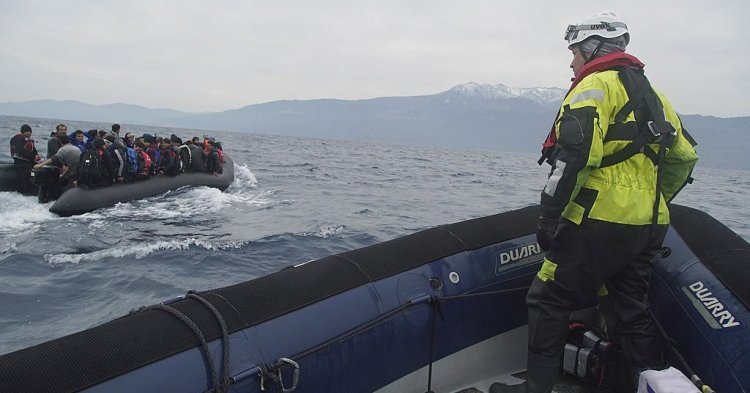On Wednesday the 14th of June, just a few days before World Refugee Day, an overloaded boat sank off the coast of Greece.
On the night of Tuesday 13th to Wednesday 14th, the Mediterranean was once again the scene of a tragedy. A fishing boat bound for Italy from Libya sank off the Greek coast carrying between 400 and 750 people.
According to Greek authorities, over 500 people perished, while 104 were rescued during the rescue operation. It remains difficult to establish the exact number of casualties. According to Le Monde, this tragedy is one of the deadliest since 2016. Since the beginning of the migration crisis, the Mediterranean Sea has become a veritable graveyard - with no graves or memorial plaques.
Following this tragic event, Greek Prime Minister Kyriakos Mitsotakis declared a 3-day national mourning period.
One story, several versions and gray areas
The boat had already been spotted by Frontex on Tuesday afternoon. According to the European border and coast guard agency, founded in 2004, the passengers refused all assistance, just before capsizing. Various testimonies from survivors and statements from NGOs on the spot dispute the official version of Frontex. Serious accusations have been made concerning the agency’s actions and decisions. The High Commissioner for Refugees’ Special Envoy for the Western and Eastern Mediterranean, Vincent Cochetel, gathered bloodcurdling testimonies from survivors: According to them, the boat tipped over as the coastguards pulled it “out of the Greek sea rescue zone.” Accusations of push-backs made by Frontex are nothing new. They were widely denounced by Jean Ziegler in his publication Lesbos, la Honte de l’Europe.
Another technique, developed by Frontex in particular, is proving particularly effective: the coastguard boat circles the refugees’ Zodiac at high speed and at ever-closer range, creating violent waves that shake the boat, threatening to capsize at any moment.
With this in mind, the International Organization for Migration and the United Nations High Commissioner for Refugees have jointly recalled that “the obligation to rescue without delay persons in distress at sea is a fundamental right of international maritime law.” Numerous NGOs such as Médecins Sans Frontières and Humans Rights Watch, meanwhile, have called on the European Union to act in order to offer a more effective European rescue. Since 2015, these NGOs have been documenting the EU’s push-back operations.
In view of these gray areas, the Greek Supreme Court has opened an inquiry to better understand what really happened.
International law constantly violated
When migrants manage to cross international seas, facing numerous threats, whether they are natural threats or not, the struggle continues.
In June 2018, the European Greens/EFA parliamentary group published a report entitled “The EU-Turkey statement and the greek hotspots, a failed European pilot project in refugee policy” in which some MEPs expressed their concerns about - among other things - the violation of international law and the transformation of hotspots into unsanitary detention facilities. In these hotspots, NGOs constantly note the violation of the fundamental rights of refugees, asylum seekers and migrants at European borders. For example, due to understaffing at EASO (the European Asylum Agency), the fundamental right to apply for asylum is constantly violated. Waiting times are far too long, and migrants sometimes have to wait years before their asylum application is considered. A further constraint arises once an appointment has been obtained: interview times between asylum seekers and EASO officials are deemed too short to adequately explain the reasons for the application.
Overcrowded boats: the miracle of survival
The conditions under which migrants cross international waters are notoriously rudimentary and dangerous. Shipwrecks are therefore sadly frequent. Moreover, this tragic event once again highlights the risky practices of smugglers, who take advantage of migrants’ distress to maximize their profits. In order to increase the number of people on board, smugglers usually forbid passengers to wear life jackets. Survival then becomes a miracle.
Nine smugglers were arrested in the port of Kalamata following this shipwreck in the Mediterranean. The men, aged between 20 and 40, are suspected of illegal human trafficking.
Sea crossings doubled in 2023
A few days ago, Frontex reported an increase in irregular entries in the central Mediterranean, the main migration route. The agency recorded the highest figures since 2017. It is nevertheless necessary to distinguish the number of entries and the number of people to avoid dishonest instrumentalization of these figures. According to Agence France Presse’s fact-checking work, the Frontex agency counts the number of crossings and not the number of people, as the same person may attempt to cross the border several times in the event of being sent back.

Follow the comments: |
|
